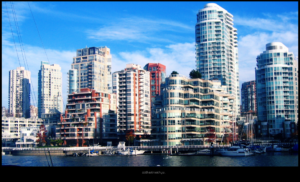
On July 13, 2016, Vancouver City Council approved the Zero Emissions Building Plan – an action plan that lays out a phased approach to aggressively combat and reduce carbon pollution in Vancouver.
Vancouver is the first major city in North America to establish specific targets and actions to achieve zero emissions in all new buildings by 2030. The phased approach aims to reduce emissions from newly permitted buildings by 70% by 2020 and 90% by 2025.
Background/Context
Vancouver’s Greenest City Action Plan (GCAP) includes targets to achieve carbon neutral new construction and to reduce emissions from existing buildings and industry by 20% from 2007 levels by 2020.
Changes to the City’s Building Bylaw and the introduction of green building requirements for rezonings have successfully begun to transform construction practices in Vancouver. Emissions from newly constructed houses have been reduced by 48% as compared to 2007. Sixty seven large condominium, apartment, and commercial buildings representing over 8.5 million square feet of new development are under construction or have been built to achieve LEED Gold certification. These building are shifting standard construction approaches towards more efficient lighting, heating, and water systems along with improved ventilation system designs and the use of healthier materials for improved indoor air quality.
In addition, the increased production of renewable electricity in BC combined with recent trends towards warmer winters and City/energy utility programs to support and incentivise energy conservation have reduced GHG emissions from existing buildings and industry by 20% as compared to 2007, meeting the GCAP target for 2020.
Building on this success, Council established more aggressive and longer term targets in the fall of 2015 with the adoption of the Renewable City Strategy. This Strategy targets 100% of all energy used in Vancouver come from renewable sources by 2050.
If all buildings are to use only renewable energy by 2050, the sooner new buildings achieve near zero emissions, the fewer buildings there will be that require costly and challenging deep energy retrofits to achieve the target.
In adopting the Strategy, Council directed staff to bring forward a plan to action these measures that was to include recommendations on achieving zero emissions new buildings by 2030 or sooner where possible. This Zero Emissions Building Plan is staff’s response to this direction.
This is a Plan to fundamentally shift building practice in Vancouver in just under 10 years. It focuses building policy, catalyst tools, and an investment in capacity building on high performing building envelopes and transitioning to100% renewable energy for new buildings.